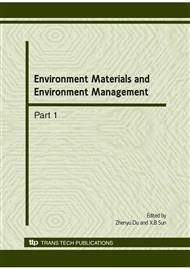p.296
p.301
p.305
p.311
p.317
p.322
p.327
p.331
p.335
Relationship Analysis between the Response to Participate in Eco-Compensation and Livelihood Assets: A HeiHe River Basin Example
Abstract:
For a long time, these are deeply entrenched in people’s thinking and the institutions or policies of economic activities that the resources are unlimited and the environment exists priceless. Environmentally augmented household livelihood assets were collected from 300 sample households within the HeiHe River Basin. Results show that physical assets possess a maximum value (0.609) and natural assets possess relatively low values (0.241). The human capital, natural capital, physical capital, financial capital and social capital are all important factors to influence the responses. An increment of one unit should reduce the occurrence to participate in ecological compensation for natural capital. Therefore, the local governments should actively introduce the relevant supporting measures in order to provide more non-agricultural employment opportunities for farmers.
Info:
Periodical:
Pages:
317-321
Citation:
Online since:
June 2010
Authors:
Price:
Сopyright:
© 2010 Trans Tech Publications Ltd. All Rights Reserved
Share:
Citation:


